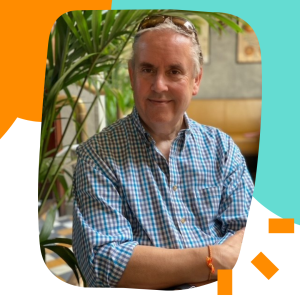Dave's story
In August 2015, Dave, a father-of-three who lives in Bristol, was diagnosed with breast cancer. Each year, 300 to 400 men will receive the same diagnosis.
I was on holiday in Florida. On my birthday, I was in the shower, and I felt a lump in my right breast. Now most men would tend to think, “Oh, it’s just a boil, you know, men don’t get breast cancer.”
But I’d had some fatty tissue removed off my chest a few years beforehand. I made a comment to the surgeon, who told me that men can get breast cancer, so I knew it was possible.

My diagnosis
I saw my GP when I got back, who was superb. She just took it on face value and said, “It’s probably fatty tissue, but we need to get it checked.” When the breast cancer surgeon did the ultrasound, he clearly wasn’t happy with what he saw. So, I ended up having a biopsy and a week later I was being told that I was one of the 300 to 400 men who get breast cancer each year.
There’s two ways you can deal with it. You can either feel all doom and gloom, or you can do everything you can to do something about it and stay positive.
And my first reaction was to sign up for the Moonwalk, a charity fundraising walk organised by breast cancer charity Walk the Walk. I’d done it in 2012, three years previously. I did the full marathon walk and I thought, you know, I’ll do it again, and that’ll give me a focus because I signed up in the October when it was due to happen the following May.
My treatment
 Shortly after my diagnosis, I had the right-side mastectomy as well as having my lymph nodes removed. It later turned out that they didn’t need to take out my lymph nodes, but they were playing safe.
Shortly after my diagnosis, I had the right-side mastectomy as well as having my lymph nodes removed. It later turned out that they didn’t need to take out my lymph nodes, but they were playing safe.
I then had six rounds of chemotherapy over 18 weeks. I can only speak to my experience, but I found that the biggest problem with chemotherapy is that one week you’re fine. The second week you’re fine. Then you like hit a brick wall and you go into like a black mist, and you just can’t focus. You just can’t think. That was the worst part, just being unable to focus for five or six days and then you come out of it the other end.
I finished my chemotherapy in May of 2016. They wanted to do the radiotherapy literally back-to-back, but I asked for six weeks off to do the Moonwalk.
Taking on the Moonwalk
Originally, I planned to do the full 26 miles, but I wasn’t really that well, so I applied to go onto the 16-mile route. I did it literally a week after my chemo finished. My wife was quite concerned about whether I’d be able to complete it. But being the stubborn individual that I am, I decided that I would.
I had a friend called Eddie, who is a retired special forces guy, and he said he would follow me around and make sure I was doing okay. Every mile, Eddie would pop out of the bushes, all dressed in black, as you would classically expect someone in the special forces to dress. He’d then say, “What day is it? Yes. What’s your name? Yes.”
And he’d make me answer all these questions then disappear. He was going around the route in the car, so he was never more than a few yards away in case I needed to pull out. My wife’s children and my children all did the 26 mile walk too, so I had lots of support.
At the end of the walk although I was exhausted however, I also felt I had given breast cancer a poke in the eye!
Meeting Penny Brohn UK
I knew of Penny Brohn UK because Walk the Walk is very proud of their association with the charity. They said,” Oh, you’re in Bristol. Why did you never look at Penny Brohn UK? Go and see what they can do for you.” So that’s what I did.
As a person going through cancer, it’s very easy to forget the people who are on the journey with you. In my case, that would be my wife. So, every stress and strain I went through, she was going through it too.
The visit to Penny Brohn UK was like somebody putting a metaphorical arm around her. We went to a group session, which was an opportunity to talk about what we’ve gone through. You open up about worries and concerns and meet other people who are on the same journey, so you can understand that you’re not alone. It was a very rewarding day and an important part of our journey.
In June 2016, I completed my treatment, and I came out the other end. Touch wood, I’m currently cancer free. Now there is absolutely no guarantee that of course it won’t come back. And if it comes back, it’s likely to be more difficult, so I have the Penny Brohn UK card in my back pocket and would be the first to use it.

Raising awareness
A lot of what I do now is about raising awareness around two things. Firstly, the fact that men can get breast cancer. Secondly, I’m a crusader in the sense of getting guys to get themselves checked.
This all started when I applied to do the Moonwalk, and I put down on my application form that I was a man with breast cancer. About ten minutes later, I had a phone call from the Walk the Walk team, and they said: “We see here that you’re a man with breast cancer. We’d like to talk to you. We’re looking at doing an awareness campaign with men.”
The first thing my wife and I ended up doing is Good Housekeeping. They did a two-page article on my wife and I, primarily from my wife’s angle in terms of what’s it like to live with a man who’s got breast cancer.
I was then approached by Doctor Kerry Quincey and Doug Harper who were setting up The Men’s Virtual Meet Up – an online group run by and for men who have, or have had, breast cancer. I was asked if I’d like to work with them, which I said yes to. I’ve got to say, it’s been a busy couple of years.
I now sit on the National Institute of Clinical Excellence breast cancer working group and that’s the group that dictates the treatment that should be available to people living with breast cancer across England and Wales. I’m there as the male voice to make sure that, when they consider things, they don’t forget the male perspective.
So, for me, breast cancer, has been a positive, life-changing experience that I would not choose to have had. That’s the best way I could put it.
Advice for others
If I was giving somebody one piece of advice it would be to try and find something to focus on to help you go through the journey. In my case, it was the Moonwalk, but there are so many other things you can do.
I think the male attitude tends to be not to make a fuss. They’re definitely more reticent about actually getting problems sorted.
I’m constantly saying to people that if your body changes, particularly when you start to get into middle age, go see your doctor. They’re not going to laugh at you. They’re not going to think that you’re wasting their time. They’re not going to think badly of you.
In my case, what I had was an aggressive form of breast cancer. But because I responded so quickly, I gave myself the best opportunity to do something about it. The breast cancer surgeon said that, if I’d have waited four to six weeks, it could have been very different.
It’s critically important that, if you get a lump in your chest that’s not supposed to be there, you go get it checked.








